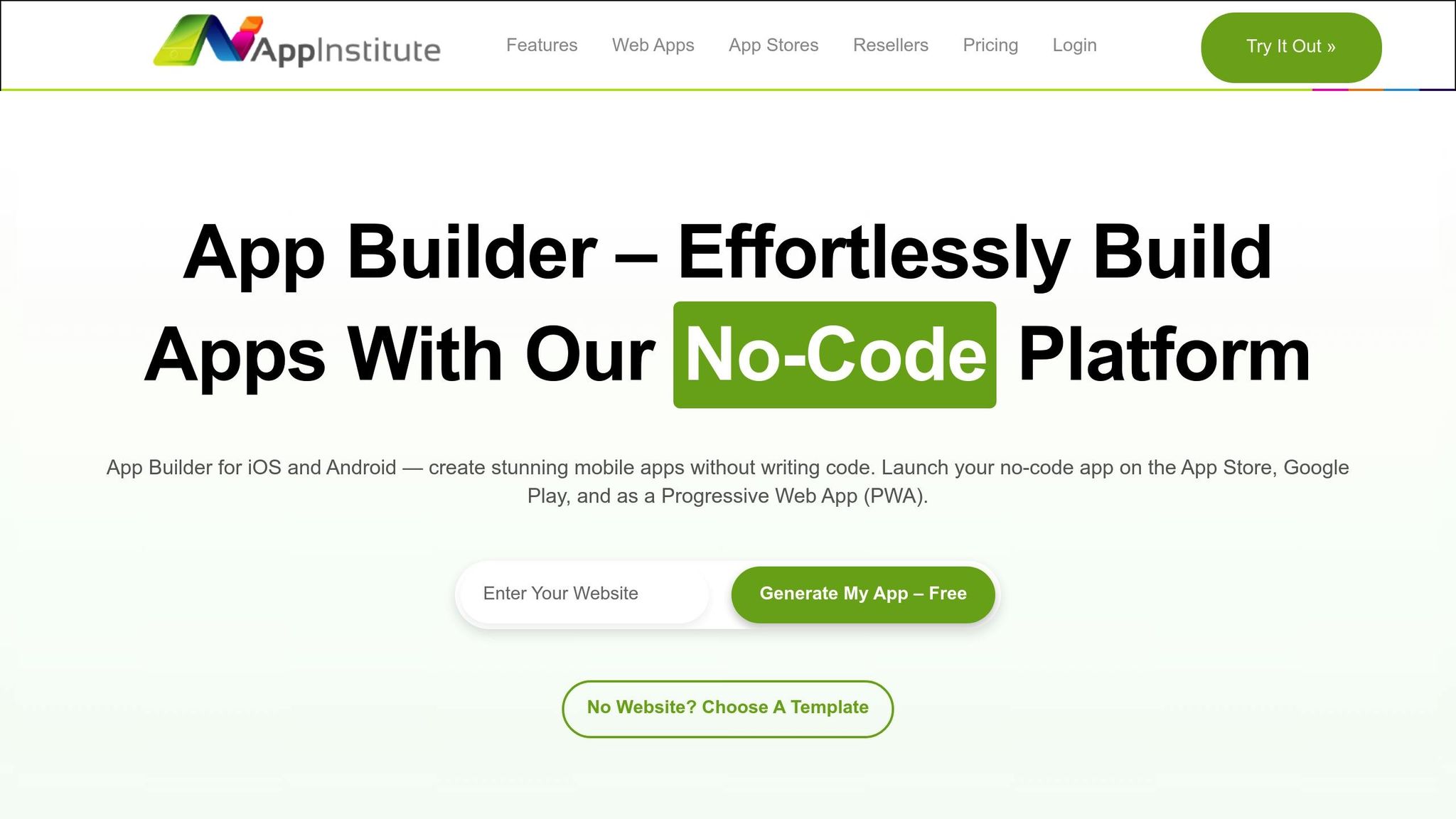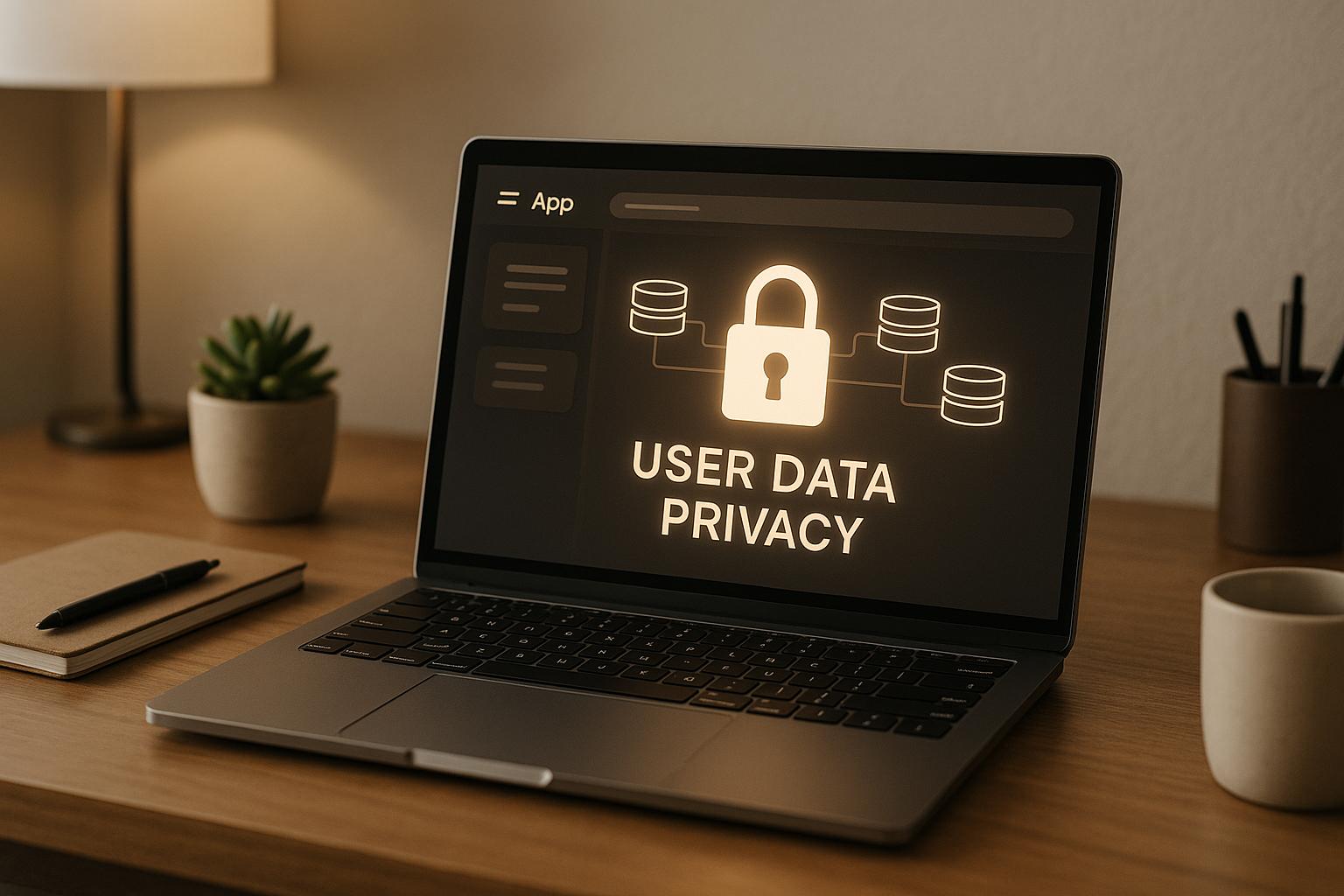No-code platforms simplify app creation but bring challenges with user data privacy. They help businesses comply with regulations like GDPR and CCPA by offering tools for consent management, data security, and automated compliance. Features like encryption, consent banners, and data residency options reduce risks, but businesses must still follow best practices for data handling.
Key Points:
- Consent Management: Tools for opt-in/opt-out compliance with GDPR and CCPA.
- Data Security: Encryption, security audits, and role-based access.
- Automated Compliance: Handles data requests and generates privacy documentation.
- Cross-Border Data Transfers: Uses legal mechanisms like SCCs for international data handling.
- Third-Party Integration: Requires careful vetting to align with privacy policies.
Platforms like AppInstitute offer privacy tools but may have limitations for industries needing stricter controls like healthcare or finance. Their basic plan starts at $49/month, with premium options at $149/month for added support. While user-friendly, scalability and customization could be concerns for growing businesses or those with complex needs.
Créer des solutions no-code RGPD friendly

How No-Code Platforms Handle Data Privacy
No-code platforms face a unique balancing act when it comes to data privacy. They need to deliver user-friendly tools while ensuring robust protections for sensitive information. How these platforms handle user data can significantly influence compliance with privacy regulations.
One cornerstone of this process is consent management. Many no-code platforms integrate Consent Management Systems (CMS) to simplify compliance. These systems include consent banners and preference centers that display legal notices and record user consent before any data collection begins. They also manage the technical side of storing consent records and tracking user preferences across different regions.
This is particularly helpful for businesses operating across multiple states or countries. For instance, the California Consumer Privacy Act (CCPA) requires opt-out options, while the General Data Protection Regulation (GDPR) mandates opt-in consent. No-code platforms often provide templates that automatically adapt to a user’s location, ensuring compliance with both CCPA and GDPR without requiring app creators to have deep legal expertise.
Another essential layer is the data security infrastructure. Leading no-code platforms implement enterprise-grade measures like encryption (both at rest and in transit), frequent security audits, and SOC 2 Type II compliance. These measures secure the platform itself, but app creators also play a role. They need to enforce best practices such as proper data handling, setting up user roles, enabling two-factor authentication, and regularly reviewing access permissions.
Automated compliance tools are another major feature. These tools streamline processes like responding to data subject requests – whether for access, correction, or deletion of data – and generating key documentation like privacy impact assessments or breach notifications. Automation minimizes human error and promotes consistent compliance.
For U.S. businesses with international users, cross-border data transfers are a critical concern. After the invalidation of Privacy Shield, many platforms now rely on Standard Contractual Clauses (SCCs) and other legal mechanisms to ensure data transfers between the U.S. and Europe remain lawful. Additionally, many platforms offer data residency options, allowing businesses to choose where their users’ data is stored and processed. This is particularly crucial for companies serving European customers or operating in industries with strict data localization requirements.
Third-party integration management is another area that requires attention. No-code apps often connect to external tools for analytics, marketing, or customer support. While platforms vet these integrations and handle technical aspects like API security and data mapping, app creators are responsible for ensuring that these services align with their privacy policies and user consent preferences.
Lastly, real-time monitoring and alerts provide ongoing oversight. Dashboards track data processing activities, flag unusual access, and notify administrators of potential issues. In some cases, platforms can even suspend processing if unauthorized access is detected.
Ultimately, the effectiveness of these privacy features depends on how seamlessly they are integrated into the app development process. The best no-code platforms make privacy compliance feel like a natural part of building an app, encouraging creators to adopt strong data protection practices from the very beginning.
1. AppInstitute

AppInstitute’s no-code platform emphasizes data privacy, making it easier for businesses to navigate privacy concerns without requiring advanced technical or legal knowledge. The platform includes built-in tools for securely managing user data across both Progressive Web Apps and mobile apps. This approach aligns with the growing need for secure data practices in no-code solutions.
Data Security
AppInstitute employs industry-standard security measures to protect user data. It also provides user management tools that limit access to sensitive information. For businesses on the premium plan ($149/month), a dedicated account manager is available to offer personalized guidance on privacy and security.
GDPR and CCPA Compliance
The platform assists app creators in meeting GDPR and CCPA requirements by offering tools to integrate privacy notices and consent settings. These features ensure that businesses can remain compliant while managing user data responsibly.
Handling User Data Requests
AppInstitute simplifies the process of managing user data requests. This includes responding to inquiries and updating records efficiently, helping businesses maintain transparency and build trust with their users.
sbb-itb-539ae66
Pros and Cons
AppInstitute’s privacy features come with a mix of strengths and limitations. Here’s a breakdown of what works well and what might pose challenges:
| Advantages | Disadvantages |
|---|---|
| Compliance tools – Built-in features to address GDPR and CCPA requirements. | Limited customization – Advanced privacy settings may need technical expertise to implement. |
| Affordable pricing – Entry-level plans start at $49/month. | Platform dependency – Businesses rely on AppInstitute for updates to maintain compliance. |
| User-friendly interface – Designed for non-technical users, making privacy settings easy to manage without coding. | Standardized approach – Might not fully meet the needs of industries with specific privacy regulations. |
| Dedicated support – Premium plans ($149/month) include guidance from an account manager. | Scalability concerns – Growing businesses may outgrow the platform and require more adaptable solutions. |
The platform’s ease of use is a standout feature, especially for small businesses looking to implement privacy measures without hiring specialized staff. Its affordability also makes it an appealing choice for those working within tight budgets.
That said, its standardized approach might not be suitable for industries like healthcare or finance, where stricter or more tailored privacy controls are often required. Additionally, while the subscription model keeps upfront costs low, businesses should weigh the long-term expense – premium plans, for instance, total about $1,788 annually.
Conclusion
No-code platforms like AppInstitute make it easier for businesses to create apps while keeping user data privacy in mind. With its drag-and-drop editor and templates tailored to specific industries, even those without technical expertise can set up privacy features effectively.
That said, while these platforms offer many advantages, they also have their limitations. To manage data privacy effectively, it’s important to weigh the pros and cons of the platform you choose. AppInstitute’s pricing begins at $49 per month for its basic plan, making it a budget-friendly choice for small businesses and startups. However, industries like healthcare or finance might require more tailored solutions to meet stricter privacy demands.
For app creators, it’s essential to regularly review privacy settings, stay updated on regulatory changes, and plan for future growth to ensure their apps remain secure and compliant.
FAQs
How do no-code platforms like AppInstitute protect user data and comply with GDPR and CCPA?
No-code platforms, such as AppInstitute, prioritize user data privacy by integrating features that make it easier to comply with regulations like GDPR and CCPA. These platforms typically offer tools to manage cookie consent, draft privacy policies, and handle user rights, including data access and corrections.
AppInstitute simplifies the process for app creators by enabling them to implement privacy safeguards without needing technical expertise. Through automation of critical compliance tasks – like collecting user consent and securely managing data – the platform helps users adhere to changing privacy laws while fostering trust with their app users.
What challenges do no-code platforms face in meeting strict data privacy requirements for industries like healthcare or finance?
No-code platforms often encounter hurdles in industries with strict regulations, such as healthcare and finance. This is largely due to the limited control these platforms offer over security features and data storage. For example, meeting stringent requirements like HIPAA for healthcare or PCI DSS for financial services can be challenging.
Another concern is the potential for vulnerabilities, such as data breaches or weak API security, which could expose sensitive information. While some no-code tools are making strides in improving privacy and compliance features, many still lack the advanced security and customization options that organizations in these sectors require. This gap can create significant obstacles for businesses operating in highly regulated environments.
How can businesses ensure third-party integrations on no-code platforms comply with their privacy policies?
To ensure third-party integrations on no-code platforms align with your privacy policies, start by adopting secure authentication methods. This includes frequently updating credentials and enforcing strong access controls to limit vulnerabilities.
Practice data minimization by sharing only the information that’s absolutely necessary and sanitizing sensitive data before it’s transmitted. Additionally, protect data in transit by using encrypted communication channels like HTTPS. Configuring granular user permissions is another key step to restrict access and prevent unauthorized use.
These measures not only help protect user data but also support compliance with privacy laws such as GDPR and CCPA.
Related Blog Posts
- How to Build an App Without Coding Skills
- Small Business App Development: Complete Guide
- Top 7 No-Code Trends for Cross-Platform Apps 2025
- How Subscription Apps Generate Recurring Revenue
Last Updated on September 4, 2025 by Ian Naylor

0 thoughts on “How No-Code Platforms Handle User Data Privacy”